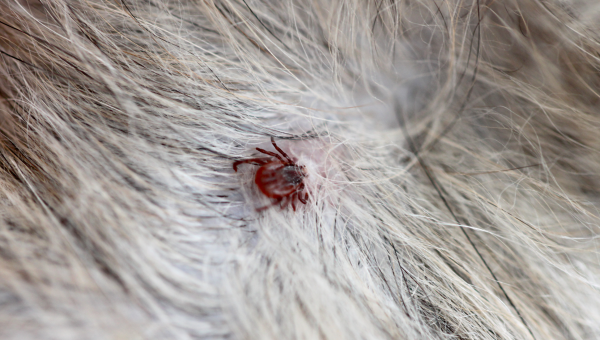8 diseases you can catch from animals—and some you definitely can't
Keep on loving your dog, cat, bird or turtle! Just watch out for these.

Sharing your life with a pet has numerous health benefits, including reduced stress and a stronger immune system. Unfortunately, pets may also carry certain illnesses—like rabies, toxoplasmosis and worms—that can be passed on to us pet parents.
Lincoln P. Miller, MD, co-chief Section of Infectious Diseases at Saint Barnabas Medical Center in Livingston, New Jersey, and clinical associate professor of Medicine at Rutgers New Jersey Medical School, explains how your pets contract and spread these maladies, and how you can keep from getting sick.

Rabies
Rabies is a virus that may cause fever, headache, muscle aches, excess salivation, paralysis and mental confusion. It's transmitted in the saliva of rabid animals who bite and break your skin; the virus cannot penetrate intact skin. If you are bitten by a rabid animal, you will have to get a series of vaccines. Left untreated, it can be fatal.
Though you can get rabies from a pet, Dr. Miller says the risk of contracting it that way should be downplayed. "Most states require pet owners to get their dogs (and cats) vaccinated,” says Miller. "Our real concern should be bats, raccoons, foxes and other wild animals—usually nocturnal ones you see out during the day." In fact, 70 percent of all reported rabies cases in the U.S. can be attributed to bats, according to a June 2019 report from the Centers for Disease Control and Prevention.
If you’re out walking your dog and see a wild animal, it’s wise to stay as far away as possible. If your dog is bitten and isn't vaccinated, he could get the rabies virus. Keep your pets and yourself safe by reporting wild animal sightings to local animal control or your police department.

Cat scratch fever
Cat scratch fever is spread to cats from flea bites and flea droppings; it's common, and cats themselves don't show any symptoms of disease. However, when an infected cat with bacteria in its blood licks your open wound, or bites or scratches you hard enough to penetrate your skin, you can develop the condition. It’s especially harmful to young children and people with compromised immune systems. Infected cats can pass it on to other cats, too.
Symptoms include fever, headache, a poor appetite and feeling tired; infected areas may swell, turn red and emit pus. While the disease often goes away on its own, if it progresses—which is rare—your lymph nodes can swell, causing you pain. To treat it, you'll need to get antibiotics from your doctor.
To prevent your feline from getting cat scratch fever, make sure they're free of fleas; keeping them indoors and out of contact with stray cats can help. If they do get fleas, speak with your veterinarian about topical lotions. To avoid contracting the disease yourself, don't play roughly with kittens and older cats—especially strays. Washing your hands with soap and water right after spending time with cats can also help.

Salmonella
You may have heard that salmonella is usually contracted by eating and handling infected food. However, it can also be spread by a variety of pets, including:
- Dogs
- Cats
- Birds and poultry
- Rodents, like guinea pigs and hamsters
- Reptiles, like turtles, snakes and lizards
- Amphibians, like frogs
Animals get it by eating contaminated food; sometimes when people feed them tainted raw meat. The bacteria can then show up in their stool, which may spread to their fur, feathers or scales. You can get salmonella if you don’t wash your hands after handling an infected animal.
Symptoms of salmonella include diarrhea, vomiting, fever and abdominal cramps. Infants, older adults, and people with weak immune systems are more likely than others to develop severe illness, which, if it goes without treated, may be deadly. That’s why it’s important to see your doctor immediately if you have any of the symptoms.

Campylobacteriosis
Like salmonella, campylobacter usually occurs when we eat raw or undercooked poultry. We can also get it by drinking contaminated water or unpasteurized milk—or, occasionally, by coming into contact with infected animals. Approximately 1.3 million Americans get campylobacteriosis each year.
While humans are far more likely to contract the illness from contaminated food, your dog or cat can carry campylobacter, which resides in their intestines. Puppies and kittens who live in crowded and unsanitary conditions are prone to getting it. The bacteria are found in their feces, and diarrhea is often a telltale sign your pet may have the disease.
You can catch campylobacteriosis by touching pet feces and not washing your hands right away. The most common symptom is diarrhea—sometimes with blood—but you may also have abdominal pain, vomiting, fever and weight loss.
The good news is that if you do contract campylobacter, you can usually recover on your own. People with weakened immune systems may need medical attention.

Worms
While it’s not too common, it’s possible to get roundworms, hookworms or tapeworms from your infected cat or dog.
- Roundworms look like spaghetti noodles and can range from 1 to 7 inches long. People become infected by accidentally ingesting their tiny eggs, through contaminated feces or dirt.
- Hookworms are less than 1 inch in length. They’re called “hook” worms because their hooks resemble vampire-like teeth. These teeth can attach to the wall of your small intestines. If your skin comes into contact with the feces of an infected dog—say, by kneeling or walking through the poop—you can be infected.
- Tapeworms are long and flat and can reach up to 28 inches in length. They come from swallowing infected fleas, though it's very rare for humans to get them.
Look for nausea, weakness, diarrhea, abdominal pain, loss of appetite, exhaustion, and weight loss. In rare cases, worms can find their way to your intestines and lead to serious complications.
Worms may not be easy to see, and some may congregate around the anus of your cat or dog; you can also find them in their stool. If you notice worms, take your pet to the veterinarian. They will prescribe medicine to eradicate the problem.

Toxoplasmosis
Toxoplasmosis is found in raw meats and garden soil. Your outdoor cat can get it by killing and eating infected wild animals. He can also catch the disease by coming into contact with infected cat feces.
The good news is you cannot get the illness via direct contact with your cat. However, cleaning his litter box and not washing your hands with soap and water is a culprit. Though symptoms are rare, some say it's like having a mild flu.
Toxoplasmosis can cause problems for anyone with a compromised immune system, including pregnant women. While it's uncommon, they may miscarry or have a stillbirth. That's why pregnant women are advised to have someone else in their house clean the litter box. People with weakened immune systems should do the same.
If you do contract the disease, you’ll be treated with antibiotics.

Bird-borne illnesses
Though rare, you can get ill from your pet bird or favorite flock of chickens. Symptoms range from minor skin infections to breathing problems, from diarrhea to a fever. Like other diseases passed on by animals, older adults, young children and people with immune system issues can have more serious infections.
Three known diseases that can be passed from pet birds to us include:
- Cryptococcosis is a fungus found in contaminated pigeon droppings. You can get it by breathing in contaminated dust, or if the fungus comes into contact with an open wound.
- You can catch avian tuberculosis from being around bacteria in the environment of infected birds. If you notice your pet bird has become depressed or weak, has lost weight or has diarrhea, take him to the veterinarian to rule out avian tuberculosis.
- Parrot fever is another bacterial disease you can get by breathing in the secretions of infected parrots, parakeets and macaws.
Prevention for these diseases includes washing your hands with soap and water, especially after cleaning the bird cage if you haven't worn gloves. Also, beware of sharp beaks and claws, which can break your skin; germs can spread into the open wounds. If you are bitten or scratched, clean the area with soap and water and call your doctor.
While these illnesses are uncommon, it’s smart to seek medical attention if you suspect one. If left untreated, they can cause severe infections of the lungs, among other complications.

Tick-borne illnesses
“Dogs and cats can bring ticks inside your house,” says Miller. “They can fall off your dog and live for months and months after a blood-gorged meal. They're very resilient.” Certain types of ticks spread particular diseases, and the majority of tick bites don't result in illness. Still, there are some you should be aware of.
Lyme disease is one of the most well-known tick-borne illnesses. The first outbreaks were discovered in Old Lyme, Connecticut, where it got its name. Now, it's common throughout the Northeast and parts of the Midwest. Some cases have even been found in California, Oregon and Washington. You can get Lyme disease by walking in wooded areas with your dog, or from your indoor/outdoor cat, since ticks can jump from pets onto your skin.
Rocky Mountain Spotted Fever is also transmitted to humans from our dogs and cats via ticks. Symptoms include fever, chills, headache and general malaise, which makes it difficult to distinguish it from the flu or ailments with similar symptoms. If you're diagnosed with either Lyme disease or Rocky Mountain Spotted Fever, your doctor will likely prescribe antibiotics.
“When a patient comes into my office” Miller says, “I ask them about their lifestyle and if they have pets. It’s important to share all of this information with your physician to narrow the focus and find the disease."
Dr. Miller suggests that if you are outside with your dog, you should check for ticks before coming into the house. If you have indoor/outdoor cats, check their fur once they get home. He recommends using topical anti-tick products that you can apply monthly to your pets to keep the ticks at bay.

What you won't catch from your pet
While cats and dogs can get colds, coughs and the flu, those illnesses are different from the ones we get. “Our pets have their own set of pathogens specific to cats and dogs, which are not passed on to us,” Miller says.
It is possible for cats and dogs to pass these illnesses onto other cats and dogs, however. One common disease is kennel cough, an upper respiratory illness that largely affects dogs, though cats can get it, too. Signs include coughing, runny nose, sneezing, tiredness, loss of appetite and low fever. If your pet is sick, schedule a veterinary checkup. Most cases are preventable with the bordetella bacterium vaccine
If you get sick with a cold or the flu, you cannot spread that illness onto your pets. “People and pets have different immune systems and a different genetic makeup and anatomy,” Miller says.
Bottom line, however: wash your hands with soap and water. Whatever the illness, this simple exercise can stop the spread of germs so we can enjoy the time with our pets without worrying.
More On

article

article

article
